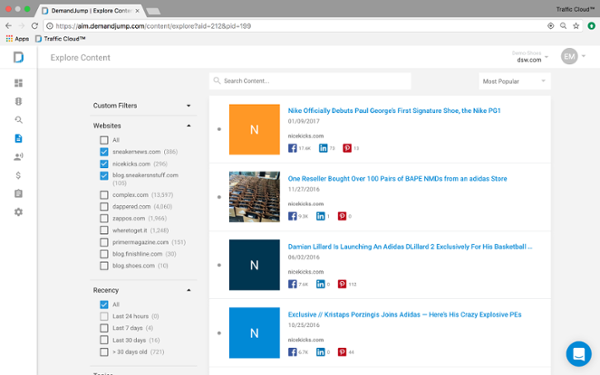By Marty Muse
In the wake of disruptions brought on by technology and competition, both B2B and B2C companies have seen their operations turned upside down. According to the American Enterprise Institute (AEI), only 12 percent of the companies that were on the Fortune 500 list in 1955 were still on that list in 2016. AEI shares that most of these companies were victims of market disruption, innovation and creative destruction.
With companies feeling more pressure to find ways to differentiate themselves from their competitors, marketing teams are tasked with finding solutions that help create successful content strategies and unique customer experiences. One of those solutions is content intelligence, a game-changer that is getting a lot of attention for its ability to revolutionize the way you do marketing.
Here are 5 things you need to know right now about content intelligence to make sure you’re prepared to gain a competitive edge:
Artificial intelligence and content intelligence are not the same
While artificial intelligence can play a role in providing the data needed for a content intelligence strategy, it is not content intelligence. The end goal of content intelligence is to provide you with insights about a broad range of data related to your target audience. Through the data and insights provided, you will have better insight on what it takes to write the right type of content to connect with each specific audience — and when and how to deliver it.
There are different types of content intelligence platforms
However, they function as technology solutions that are able to deliver insights on content and messaging to ultimately drive better marketing results. It’s likely that you are already using content intelligence. Applications, such as Google Analytics, provide you with data insights based on the traffic coming to your company’s site, including which content topics people are responding to the most and which pages lead to conversions. Advanced content intelligence platforms have been emerging in recent years that provide insights and data to help give you with a clearer, multidimensional picture of how to create, deliver and fine-tune your content and how to best spend your marketing dollars.
Content intelligence is now a necessity
More advanced forms of content intelligence are continuing to arrive. Many marketers are reporting that it’s becoming increasingly difficult to reach and connect with their target audience. However, the key is not to create more content. The solution is to give people exactly what they want — and exactly when and where they want it.
With content intelligence — through data gathered from many different sources (not just a few), you’re able to develop a more intimate relationship with every individual. You’ll be able to “get” them and “get to them.”
Time and place are everything
The data insights you gain from a marketing strategy fueled by content intelligence helps solve a critical issue of timing and place. This is an area where many marketers fail. Your marketing team is probably producing great content, but does it matter when the right people are unable to find it?
Content intelligence platforms can help you answer the critical questions: Where do you place your content at a time where your audience is most likely to see it? What are you offering? Sharing? Promoting? With comprehensive data insights, you don’t have to throw a wide net in hopes of catching the right users.
More metrics lead to a greater ability to measure your content
With a strategic marketing plan based on more relevant metrics, you’re in a better position to measure the effectiveness of your marketing strategy. You’ll be able to respond in real time to changes that need to be made. By utilizing insights and analyzing what is working, you’re positioning yourself for success and increased conversion rates.
As the content intelligence industry continues to evolve, adoption of the right solutions will be key to marketers getting the most out of content strategies. Reaching your audience is becoming increasingly difficult in a landscape that has become inundated with content. Armed with a content intelligence platform, you can gain the critical insights you need to win the battles coming your way.



